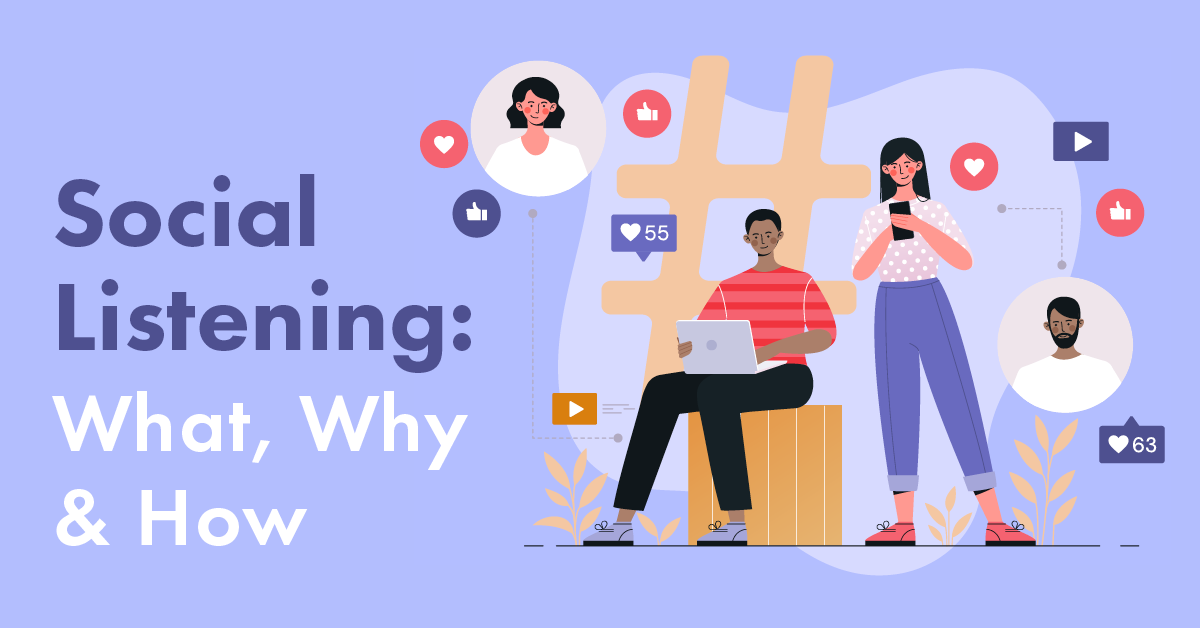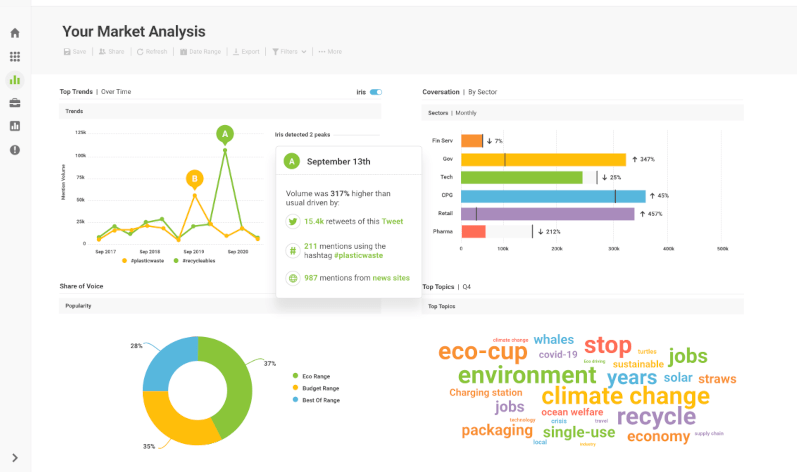In the fast-paced digital landscape, businesses and marketers need to adapt to ever-changing consumer behaviors and preferences. Social media has become an integral part of people’s lives, providing valuable insights into their thoughts, opinions, and needs. Social listening, the process of monitoring and analyzing online conversations, plays a crucial role in understanding and engaging with your target audience. In this article, we will delve into the social listening importance and how it can benefit businesses.
Social Listening Importance

Social listening refers to the practice of monitoring and analyzing online conversations, including social media platforms, blogs, forums, and news websites. It involves tracking mentions of your brand, industry keywords, and relevant topics to gain insights into consumer opinions, preferences, and trends. Unlike social monitoring, which focuses on collecting data, social listening aims to understand the underlying context and sentiment behind these conversations.
Social Listening Importance and How it Can Benefit Businesses
Understanding Customer Sentiment
By actively listening to what your customers are saying, you can gauge their opinions, emotions, and perceptions about your brand, products, or services. Positive sentiment indicates customer satisfaction, while negative sentiment highlights areas for improvement. Social listening allows you to identify and address issues promptly, strengthening customer relationships and loyalty.
Identifying Emerging Trends
Social media platforms are dynamic hubs where trends emerge and spread rapidly. Through social listening, you can stay updated on the latest industry developments, emerging topics, and shifts in consumer behavior. By identifying these trends early on, you can adapt your marketing strategies and stay ahead of the competition.
Improving Customer Service
Social media has become a popular channel for customer inquiries, feedback, and complaints. By monitoring and responding promptly to customer queries or concerns, you can provide excellent customer service and resolve issues promptly. Social listening allows you to identify patterns and recurring themes, enabling you to proactively address common customer pain points.
Enhancing Product and Service Development
Social listening importance provides valuable insights into customer needs, desires, and pain points. By analyzing the conversations around your industry, products, or services, you can identify areas for improvement and develop innovative solutions that meet customer expectations. This customer-centric approach ensures that your offerings remain relevant and competitive.
How to Implement Effective Social Media Listening

To implement effective social listening strategies, consider the following steps:
Identify Relevant Social Media Platforms
Determine which social media platforms are most relevant to your target audience. Different platforms attract different demographics and have distinct communication styles. By focusing on the platforms where your target audience is most active, you can gather more accurate and meaningful insights.
Set Up Monitoring Tools
Utilize social listening tools and platforms to streamline the monitoring process. These tools can automatically collect and analyze data from various sources, providing you with real-time updates and reports. Examples of popular social listening tools include Brandwatch, AIM Insights, and Sprout Social.
Define Search Queries and Keywords
Develop a list of relevant search queries and keywords based on your industry, brand, products, and target audience. These queries will serve as the basis for monitoring conversations related to your business. Refine and update these queries regularly to ensure they capture the most relevant information.
Analyze and Act on Insights
Regularly review the data and insights gathered through social listening. Look for patterns, trends, and actionable insights that can inform your marketing strategies and decision-making. Use this information to engage with your audience, address concerns, and tailor your content and offerings to better meet their needs.
Best Practices for Social Media Monitoring
To make the most of social listening, follow these best practices:
Monitor Brand Mentions and Industry Keywords
Track mentions of your brand, products, and services across different online platforms. Additionally, monitor industry-specific keywords and hashtags to stay informed about conversations related to your industry. This allows you to identify brand advocates, address customer feedback, and join relevant discussions.
Engage in Real-Time Conversations
Social listening provides an opportunity to engage with your audience in real-time. Respond promptly to customer inquiries, comments, and concerns to demonstrate your commitment to customer satisfaction. Engaging in conversations also helps you build relationships, gain insights, and establish your brand as an industry authority.
Respond to Customer Feedback and Concerns
When social listening reveals negative feedback or concerns from customers, address them promptly and empathetically. This shows that you value customer feedback and are committed to resolving any issues. Responding to customer concerns publicly also demonstrates transparency and can help build trust among your audience.
Track Competitor Activities
Social listening is not limited to monitoring your brand. Keep an eye on your competitors’ online activities and conversations as well. This allows you to identify their strengths and weaknesses, uncover potential gaps in the market, and adjust your strategies accordingly.
Measuring the Impact of Social Listening Importance

To measure the impact of your social listening efforts, consider the following:
Key Performance Indicators (KPIs)
Define key metrics that align with your business goals. These may include brand sentiment, engagement levels, share of voice, customer satisfaction, or conversion rates. Regularly track and analyze these KPIs to assess the effectiveness of your social listening strategies.
Tracking Sentiment and Customer Satisfaction
Monitor the sentiment of conversations around your brand to gauge overall customer satisfaction. Positive sentiment indicates a healthy brand perception, while negative sentiment highlights areas that require improvement. By tracking sentiment over time, you can measure the impact of your actions on customer perception.
Identifying Conversion Opportunities
Social listening can uncover opportunities for conversions and sales. Analyze conversations related to your products or services to identify potential customers who are actively seeking recommendations or solutions. Engage with these prospects and provide relevant information or offers to convert them into customers.
Challenges and Solutions in Social Media Monitoring
While social listening offers valuable insights, it also comes with challenges. Here are a few common challenges and their solutions:
Dealing with Information Overload
The sheer volume of data generated through social listening can be overwhelming. To overcome this challenge, use social listening tools that offer data filtering and prioritization options. Focus on the most relevant conversations and set up alerts for critical mentions or trends.
Managing Negative Feedback
Negative feedback can be discouraging, but it presents an opportunity for improvement. Respond promptly and constructively to negative comments, aiming to resolve the issue and turn the customer’s experience around. Use negative feedback as a learning opportunity to enhance your products or services.
Privacy and Data Protection
Social listening involves handling personal data, which raises privacy concerns. Ensure that you comply with relevant data protection regulations and obtain consent when necessary. Use anonymized and aggregated data whenever possible to protect individual privacy.
Case Study: Social Listening in Action. How A Brand Boosted Customer Engagement and Product Development
In this competitive age, social listening is becoming an essential tool for understanding the market. Each company needs to gain deeper insights into its customers and their preferences. In this case study you will know how a brand leverages social listening to improve customer engagement and refine its products and services.
The Challenge
- To keep up with all the changes in the customer’s preferences, and any new market trend that occurs.
- Tracking their customer’s sentiment effectively, and gaining valuable insights from it.
- Knowing their customer’s complaints and concerns in real time.
- Identifying the emerging trends that happen in the market and gathering feedback on new product ideas.
- Monitored and tracked the different conversations across social media platforms.
- They needed better tools to analyze the feedback and engage with their audience.
The Approach: Implementing Social Listening
To be able to solve all these challenges the company decided to ably a social listening strategy.
- Identifying Relevant Social Media Platforms: the brand searched about the platforms that its target audience is active on. They found that these platforms are Twitter, Instagram, and Facebook. Then they decided to track and monitor these platforms and all the conversations on it.
- Setting Up Monitoring Tools: the brand decided to use the social listening tool, AIM Insights. Helping the brand to track all the conversions and brand mentions online. The tool ensured to filtering of all the conversations, to be able to capture the important data out of the conversation.
- Defining Search Queries and Keywords: the marketing team worked on creating a list with top search engine queries. With focusing on product names, competitors, and industry trends. With keeping this list updated all the time, to make sure to have all the new updates with them.
- Real-Time Monitoring and Engagement: the brand applied a real-time monitoring strategy. Which led to responding to the customer’s queries and concerns in real-time. Leading to building customer loyalty and trust in the brand.
The Outcomes
- Improved Customer Sentiment and Satisfaction: through the process of social listening the brand was able to track the customer sentiment. Leading to work on improving this sentiment by providing the customer’s needs. Ending up with enhancing the customer’s trust and loyalty in the brand.
- Identifying Emerging Trends: by tracking the conversation across the different social media platforms, they addressed some new trends. By responding to these trends, and working on improving their products based on it, they notice an increase in their sales in the market.
- Enhancing Product and Service Development: social listening provides the brand with the customer’s needs and desires. Which helped the brand take action based on these insights. Leding to align the brand with the customer’s values, and staying away from competitors.
- Real-Time Customer Service: depending on the active engagement with the customers, the brand was able to address the customer’s issues in real time. Leading to solving these problems and providing the best services for the target customers.
Conclusion
In conclusion, social listening is a powerful tool that allows businesses to understand and engage with their target audience effectively. By monitoring online conversations, analyzing data, and acting on insights, businesses can gain valuable insights into customer sentiment, identify emerging trends, and enhance their products, services, and customer experiences.
To experience the benefits of social listening firsthand and unlock its potential for your business, request a demo from AIM Technologies. Our cutting-edge social listening platform provides comprehensive analytics and actionable insights to help you make informed decisions and drive meaningful engagement with your audience.
FAQs
How does social listening differ from social monitoring?
- Social listening focuses on understanding the context and sentiment behind online conversations, while social monitoring primarily involves data collection and tracking metrics.
Which social media platforms should I focus on for social listening?
- Focus on the platforms where your target audience is most active and where conversations related to your industry or brand frequently occur.
Can social listening help in crisis management?
- Yes, social listening can provide real-time insights during a crisis, helping you understand the sentiment, address concerns, and manage your brand reputation effectively.
How often should I review and analyze social listening data?
- Review and analyze social listening data regularly to stay updated on the latest trends, customer feedback, and industry developments. The frequency may vary depending on your business and objectives.
Is social listening applicable to all industries?
- Yes, social listening is relevant across industries. It helps businesses gain insights into customer preferences, market trends, and industry conversations, regardless of the sector they operate in.




